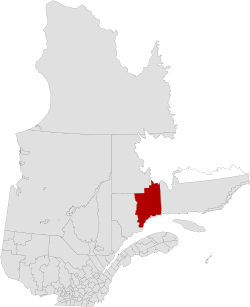Sept-Rivières Regional County Municipality
Sept-Rivières | |
|---|---|
 | |
| Coordinates: 50°08′N 66°37′W / 50.133°N 66.617°W[1] | |
| Country | Canada |
| Province | Quebec |
| Region | Côte-Nord |
| Effective | March 18, 1981 |
| County seat | Sept-Îles |
| Government | |
| • Type | Prefecture |
| • Prefect | Denis Miousse |
| Area | |
• Total | 33,007.88 km2 (12,744.41 sq mi) |
| • Land | 29,527.90 km2 (11,400.79 sq mi) |
| Includes native reserves | |
| Population (2021)[4] | |
• Total | 34,358 |
| • Density | 1.2/km2 (3/sq mi) |
| • Pop (2016-21) | |
| • Dwellings | 17,244 |
| Includes native reserves | |
| Time zone | UTC−5 (EST) |
| • Summer (DST) | UTC−4 (EDT) |
| Area code(s) | 418 and 581 |
| Website | www |
Sept-Rivières (French for "Seven-Rivers") is a regional county municipality of Quebec, Canada, in the Côte-Nord region. Its county seat is Sept-Îles.
The census groups Sept-Rivières RCM with neighbouring Caniapiscau Regional County Municipality into the single census division of Sept-Rivières—Caniapiscau. In the 2021 Canadian census, the combined population was 38,240.[5] The population of Sept-Rivières RCM itself was 34,358,[4] of whom the vast majority live in the city of Sept-Îles.
Geography
[edit]Sept-Rivières is located in the central part of Côte-Nord.[6] It is bordered by the regional county municipalities of Manicouagan, Caniapiscau, and Minganie, as well as by the southwest corner of Labrador and by the Gulf of Saint Lawrence. It is mostly covered by the Laurentian Mountains. It is a very sparsely populated and undeveloped region with its population highly concentrated along the coast, mostly at Sept-Îles (about three-fourths of the population).
It allegedly takes its name from seven major rivers that join the Saint Lawrence within the territory: Moisie, Sainte-Marguerite, Trinité, Pentecôte, aux Rochers, Pigou and Manitou. But neither the Trinité River nor the Manitou River reaches the Saint Lawrence within the limits of the regional county municipality, and many other rivers could be amongst those "seven rivers".
Subdivisions
[edit]There are four subdivisions and two native reserves within the RCM:[2]
|
|
|
Demographics
[edit]| 2021 | |
|---|---|
| Population | 34,358 (-3.1% from 2016) |
| Land area | 29,527.90 km2 (11,400.79 sq mi) |
| Population density | 1.2/km2 (3.1/sq mi) |
| Median age | |
| Private dwellings | 17,244 (total) 15,261 (occupied) |
| Median household income |
| Year | Pop. | ±% |
|---|---|---|
| 2011 | 35,240 | — |
| 2016 | 35,441 | +0.6% |
| 2021 | 34,358 | −3.1% |
| Population amounts include native reserves. Source: Statistics Canada | ||
Transportation
[edit]Access Routes
[edit]Highways and numbered routes that run through the municipality, including external routes that start or finish at the county border:[10]
|
|
|
|
River basins
[edit]There are a number of large rivers that flow in a generally north-south direction through Sept-Rivières to enter the Gulf. Near the coast the river basins tend to narrow in towards the river mouth, and between their mouths are areas that drain into the Gulf through smaller streams. From west to east, the larger river basins, which may cover parts of neighboring regions, are:[11]
| River | Basin size | Mouth coordinates | Map link | |
|---|---|---|---|---|
| km2 | sq. mile | |||
| Pentecôte | 1,986 | 767 | 49°46′48″N 67°09′52″W / 49.7800000°N 67.1644444°W | EHOZH |
| Riverin | 221 | 85 | 49°47′08″N 67°09′23″W / 49.7855556°N 67.1563889°W | EHWEN |
| Aux Rochers | 4,161 | 1,607 | 50°01′10″N 66°52′07″W / 50.0194444°N 66.8686111°W | EHWSX |
| Dominique | 263 | 102 | 50°01′35″N 66°52′05″W / 50.0263889°N 66.8680556°W | EGEDF |
| Sainte-Marguerite | 6,213 | 2,399 | 50°08′34″N 66°35′48″W / 50.1427778°N 66.5966667°W | EJGWT |
| Rapides | 573 | 221 | 50°16′07″N 66°27′26″W / 50.2686111°N 66.4572222°W | EHURW |
| Moisie | 19,273 | 7,441 | 50°12′00″N 66°04′03″W / 50.2000000°N 66.067500°W | EHHGN |
| Matamec | 679 | 262 | 50°17′01″N 65°58′00″W / 50.2836111°N 65.9666667°W | EHEPE |
| Loups Marins | 186 | 72 | 50°15′33″N 65°44′40″W / 50.259167°N 65.744444°W | EHBME |
| Pigou | 169 | 65 | 50°16′13″N 65°37′38″W / 50.2702778°N 65.6272222°W | EHQOC |
See also
[edit]References
[edit]- ^ "Banque de noms de lieux du Québec: Reference number 141179". toponymie.gouv.qc.ca (in French). Commission de toponymie du Québec.
- ^ a b "Répertoire des municipalités: Geographic code 971". www.mamh.gouv.qc.ca (in French). Ministère des Affaires municipales et de l'Habitation.
- ^ Derived indirectly from Ministère des Affaires municipales et de l'Habitation (MAMH) website, by summing up data for Lac-Walker (18881.62 km2), Maliotenam (5.28 km2), Port-Cartier (1371.79 km2), Rivière-Nipissis (10574.82 km2), Sept-Îles (2172.22 km2), and Uashat (2.15 km2) census subdivisions.
- ^ a b c "Table 98-10-0018-01 Population and dwelling counts: Regional county municipalities (RCM), Quebec". www150.statcan.gc.ca. Government of Canada - Statistics Canada. Retrieved 5 June 2024.
- ^ "Sept-Rivières--Caniapiscau, Census division (CDR) Quebec. 2021 Census of Population". www12.statcan.gc.ca. Government of Canada - Statistics Canada. Retrieved 6 June 2024.
- ^ Marie-Claude Dubé (23 August 2006). "Regional County Municipality of Sept-Rivières Map" (PDF). Quebec Gouvernement (in French). Le ministère des Ressources naturelles Canada. tous droits réservés. MRC de Sept-Rivières. Retrieved 28 May 2024.
Proposed Regional Park, Seven Islands Archipelago, Zec de la Rivière-Moisie, Proposed Groulx Mountains Biodiversity Reserve
- ^ "2021 Community Profiles". 2021 Canadian census. Statistics Canada. February 4, 2022. Retrieved 2024-06-06.
- ^ "2006 Community Profiles". 2006 Canadian census. Statistics Canada. August 20, 2019.
- ^ "2001 Community Profiles". 2001 Canadian census. Statistics Canada. July 18, 2021.
- ^ Official Transport Quebec Road Map
- ^ Portrait préliminaire de la zone de gestion intégrée de l'eau par bassin versant Duplessis (PDF) (in French), OBV Duplessis, April 2015, p. 20, retrieved 2019-09-29
